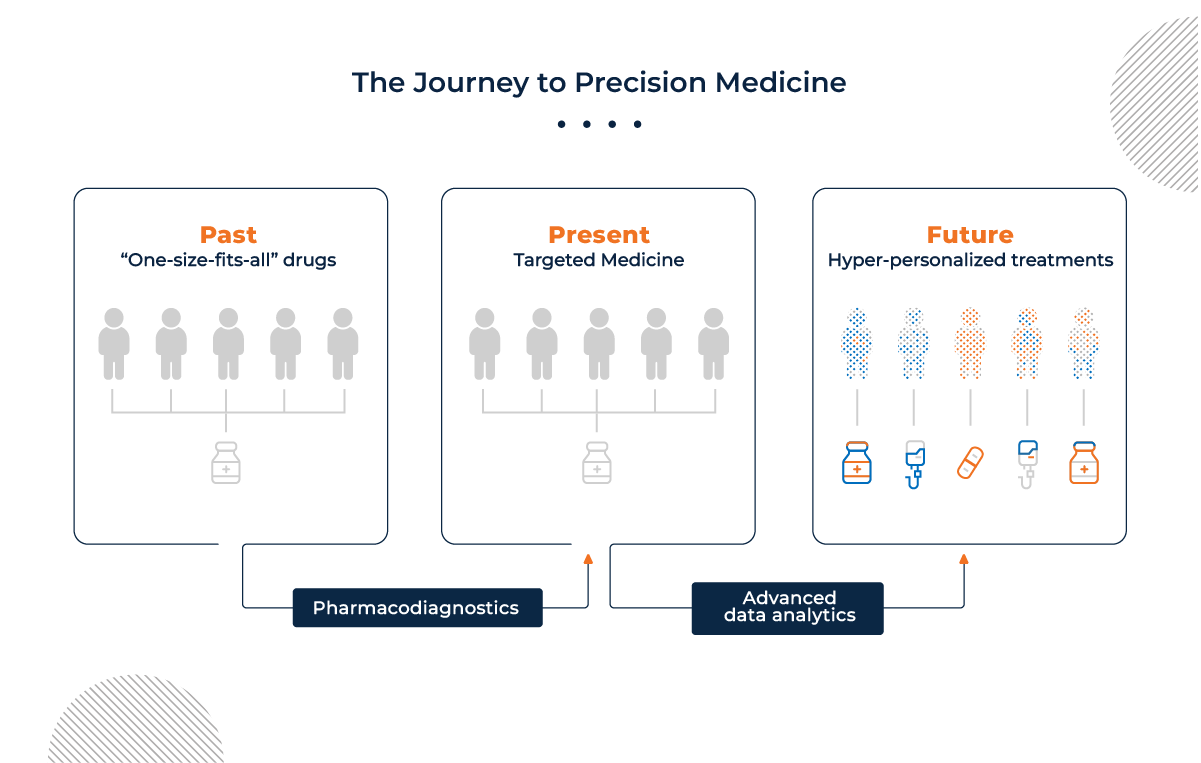It is a well-known fact that consumer demand for more personal experiences is reshaping multiple industries, and the healthcare industry is no exception. The pandemic has caused a massive change in consumer health expectations: it has hastened the transition to 24/7 care, highlighted the need for more accurate, accessible, and affordable healthcare, and shown how community-based medical providers can assist with both preventive and chronic care support. [1] [2]
The digitization of high-quality health data, such as diagnostic, treatment, and outcome data from a variety of sources, has helped the healthcare industry evolve in line with changing consumer preferences. Advancements in Machine Learning (ML), Natural Language Processing (NLP), and other analytics tools have been integral to organizing and interpreting the vast amounts of data now available, with genetic and other diagnostic technologies enabling informed choices on optimal and individualized patient care. While precision medicine is not a new concept, we have barely begun to realize its full potential to transform patients' lives through its multi-faceted approach to disease screening, diagnosis, treatment, and even prevention. A rapid adoption of this approach ensures that the appropriate therapy is prescribed to the correct patient at the right time, boosting the efficiency of healthcare systems worldwide.

Source: healthcaretransformers.com
In addition to ensuring better diagnostic speed and accuracy, precision medicine offers the following advantages:
DNA test results can provide personalized reports of genetic data. This helps predict genetic predispositions toward rare diseases.
Patient monitoring through mobile applications helps them adhere to the prescribed treatment plan as well as track disease progression. [4]
Precision medicine has the potential to usher in a new era of healthcare, with the ability to speed up clinical trials, improve outcomes, and fulfill newer patient expectations. In the near future, when a new patient goes to a hospital, their symptoms will be compared across millions of similar patients and matched to a treatment plan that the data indicates has the highest likelihood of success. However, this level of personalization is still a lofty goal at this stage, as we still have various obstacles to overcome, such as the following:
Regardless, precision medicine offers numerous advantages in advancing healthcare, from the early detection of health risks to customizing treatment plans to the individual's needs. As our healthcare technologies continue to develop, it is important to be aware of, reflect upon, and address potential concerns. The next decade should be marked by coordinated, proactive efforts to predict and tackle such difficulties as those mentioned above. As developments in technology support these efforts, health care will be reframed and redesigned, impacting the foreseeable future irreversibly.
[1] Rhee, Kyu. “3 Ways the Pandemic Has Advanced Personalized Health Care.” World Economic Forum, November 5, 2021. https://www.weforum.org/agenda/2021/11/3-ways-pandemic-advanced-personalized-health-care/
[2] “Health Care Insights Study 2021.” CVS Health, n.d. https://www.cvshealth.com/news/research-reports/health-care-insights-study/health-care-insights-study-2021.html.
[3] Meco, Antonio Di, and Robert Vassar. “Chapter Eight - Early Detection and Personalized Medicine: Future Strategies against Alzheimer’s Disease.” Progress in Molecular Biology and Translational Science, December 3, 2020. https://www.sciencedirect.com/science/article/abs/pii/S1877117320301691
[4] Visvikis-Siest, Sophie, Danai Theodoridou, Maria-Spyridoula Kontoe, Satish Kumar, and Michael Marschler. “Milestones in Personalized Medicine: From the Ancient Time to Nowadays-the Provocation of COVID-19.” Frontiers, October 26, 2020. https://www.frontiersin.org/articles/10.3389/fgene.2020.569175/full
[5] Schork, Nicholas J. “Personalized Medicine: Time for One-Person Trials.” Nature News, April 29, 2015. https://www.nature.com/articles/520609a
[6] Ventola, C Lee. “Mobile Devices and Apps for Health Care Professionals: Uses and Benefits.” National Library of Medicine, May 2014. https://www.ncbi.nlm.nih.gov/pmc/articles/PMC4029126/
[7] Bastek, Andrea. “In an Age of Precision Medicine, Decentralized Clinical Trials Are a Valuable Tool.” MedCity News, December 13, 2021. https://medcitynews.com/2021/12/in-an-age-of-precision-medicine-decentralized-clinical-trials-are-a-valuable-tool/ .,
[8] Brothers, Kyle B, and Mark A Rothstein. “Ethical, Legal and Social Implications of Incorporating Personalized Medicine into Healthcare.” Personalized medicine, November 1, 2015. https://www.ncbi.nlm.nih.gov/pmc/articles/PMC4296905/
[9] Bohr, Adam, and Kaveh Memarzadeh. “The Rise of Artificial Intelligence in Healthcare Applications.” National Library of Medicine, June 26, 2020. https://www.ncbi.nlm.nih.gov/pmc/articles/PMC7325854/

Justin Collins is a senior data science leader and life science subject matter expert at TheMathCompany, with over a decade’s experience directing teams and leading cross-disciplinary initiatives for Fortune 500 firms. Leveraging the knowledge he gained from medical school, he has been at the forefront of creating cutting-edge analytics tools to augment clinical decision-making and patient care. When he is not working, Justin can be found spending time at a golf course or getting his groove on with his closest friends.
Subscribe to our newsletter to receive latest updates